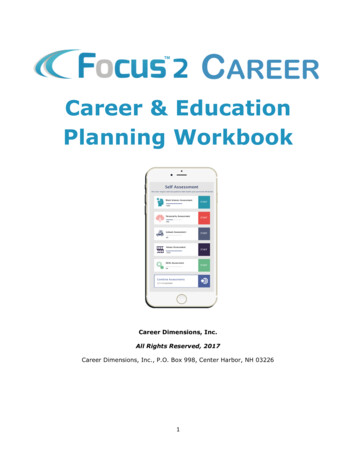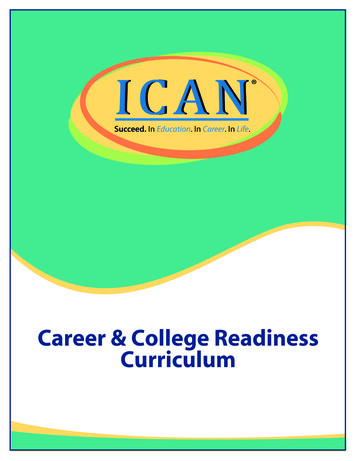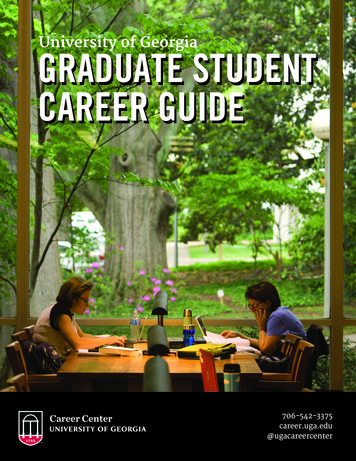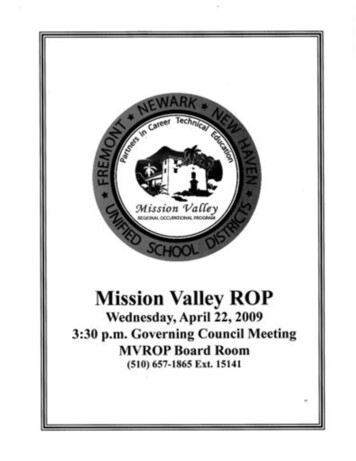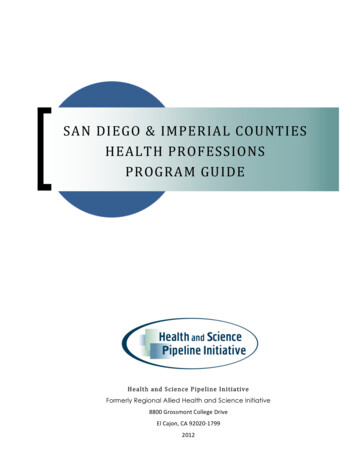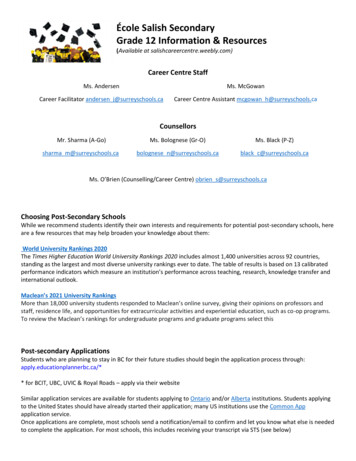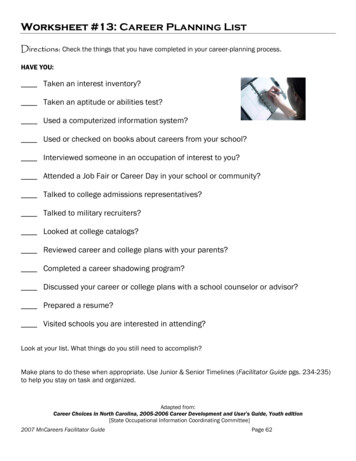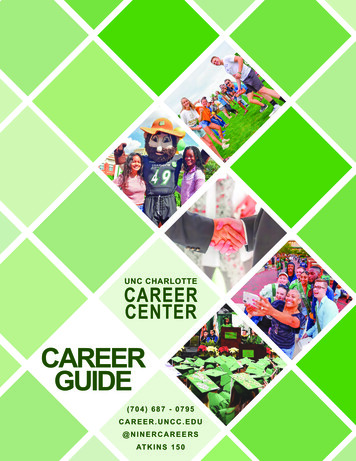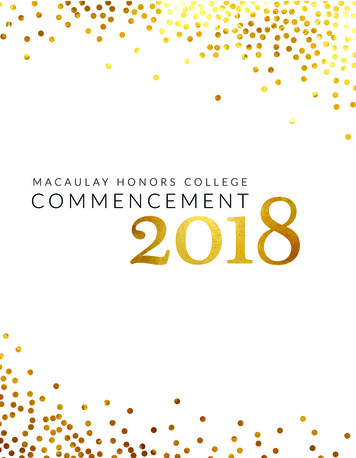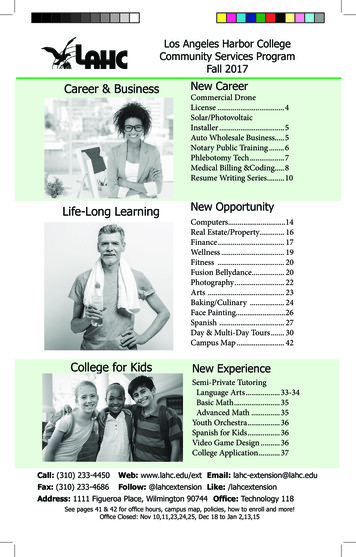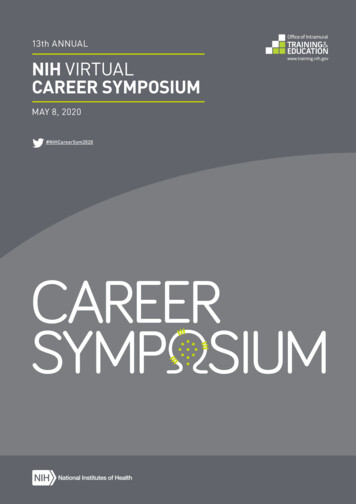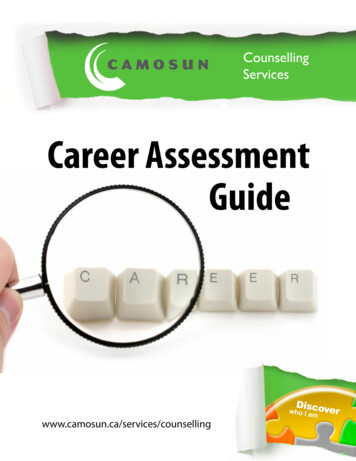
Transcription
Career AssessmentGuidewww.camosun.ca/services/counselling
IntroductionThroughout most of your elementary and even high school years you likely moved along a fairly straightforward path. Like most of yourfriends, you went from one grade to another and progressed as a group through much of the same classes and milestones. Then camehigh school graduation and the straightforward path you once knew, perhaps even enjoyed, came to an end. Everyone around you wentin different directions, started making different choices, and suddenly you were faced with decisions you had perhaps never been askedto make before. You may have cheered, “Cool, let’s go!” Perhaps you stressed, “Ummm. What do I do now?” Either way, there were bigchanges happening! Sound familiar?Undecided? It’s okay.First of all, feeling undecided or uncertain about your future is okay. In fact, it is more than okay - it is perfectly normal and we have all(yes, all) been there at some point. In fact, did you know that 60% of post-secondary students graduate from a different program thanthe one they start in? (Campbell, Ungar, & Dutton, 2008). So hey, it is okay be unsure, to take some time to experiment with differentopportunities, and to try different things on. It’s all a part of figuring out who you are, where you fit, and what you want out of life.Bye-bye cookie cutter.Your career will in all likelihood not follow a step-by-step, turn-by-turn map. There are no finite checklists, infallible formulas, or rock-solidguarantees. (Heads up - this may disappoint you, excite you, or perhaps unnerve you. Either way, we felt it was better you know this truthnow than 20 years down the road!). Some still think your career should develop in a linear path made up of a sequence of predictablesteps, kind of like this:RetireGraduate fromhigh schoolWorkGraduatefrom collegeor universityThe reality, however, is very different. Things have changed and for most young people today figuring out their career direction is one partplan, one part evolution and maybe even one part luck. Their path, and perhaps yours, may instead look something like the picture below.You might also be seeking help now, because you are somewhere in the middle of this path; that too is very normal!Change programsTake a five-year leaveGraduate with degreeGo backto schoolChange jobsStart collegeor universityWork part timeTravel abroadfor two yearsGraduate fromhigh schoolCamosun CollegeCareer Assessment Guide2
The cool thing though is that all the twists, turns, side roads, and valleys that life will throw at you can end up being some of the MOSTimportant (and enjoyable) experiences in helping you discover and understand your place in the world. In fact, 70% of high schooland university students reported that at least one ‘chance event’ influenced their educational or career path (Campbell et al., 2008).Unexpected opportunities to study abroad, volunteer, take on a ‘way out there’ summer job, or learn a new language can be life changingexperiences. For some, even losing a job or not getting into their program of choice can be a blessing in disguise.The reality is that conventional, linear career paths are quickly being replaced by ongoing exploration, development, growth, and insightwhere people are continually assessing and adapting the role work plays in their lives. So although the decisions you make at this pointare important, there will always be room to adapt, shift, and evolve. From radio producer to real estate agent, systems analyst to securityguard, playwright to parole officer, exploring a variety of opportunities and experiences offers the potential for wonderful career definingmoments. With each experience, you gain clarity and insight. This is the essence of career development.Think of it as a puzzlewaiting to be created.Essentially, creating your future is really about figuring out who you are,learning about your options, making choices, setting some goals, andthen going for it. These steps rarely unfold in this exact order andsome are repeated over and over.This puzzle sometimes gives people a nice visual to think about.Notice how all the pieces are about the same size. How, as a circle,the pattern is continuous. Well, this is because throughout yourcareer every stage is equally important and, just as we mentionedearlier, your career development is ongoing - a continuous cycle ofexploration, development, growth and insight. Also, it is not unusualfor a person to ‘walk around’ this circle several times throughout theircareer. In fact, an important part of creating your career involves ongoingevaluation and assessment of the fit between you and your work. Becauseof this, being adaptable and resilient is probably one of the best things you cando to build a successful career.It begins with you.As we mentioned earlier, feeling undecided, uncertain, overwhelmed or confusedabout your future and the choices before you is perfectly normal. Choosing tocontinue to feel that way, however, is likely not the best plan. To get to where youwant to be, you need to start figuring out who you are, where you want to go andhow to get there.Identifying your work and lifestyle preferences is a very important part of the careerdevelopment process. What types of work would you enjoy? What kinds of peopledo you like to be around? How do you define success? These are all importantand sometimes difficult questions. Being able to answer these questions, however,will help you establish clear career goals and make informed decisions about whoyou want to be. This is why we wrote this guide: to get you started on the path todiscovering who you are and what you might want your career to look like as itunfolds.Camosun CollegeCareer Assessment GuideThis is why we wrote thisguide: to get you startedon the path to discoveringwho you are and whatyou might want yourcareer to look like as itunfolds.3
How this guide works.The following pages contain a collection of six different career self-assessments. Each one is designed to offer you insight into differentaspects of your personality, interests, skills, and values. We have included assessments that are pretty simple to work with but they willtake some time and thought on your part. Some may be more interesting and perhaps offer more insight than others, but all are equallyimportant and deserve your attention.Your Career BlueprintAs you work through these assessments,all of your responses are automaticallycaptured on page 14–16 to create yourown personal Career Blueprint.Thiswill serve as a summary of all yourpreferences and ideas.Then, at the veryend, we will explore possible next stepsincluding resources for researchingoccupations, finding a job, and gettingadvice or support.Some quick tips to get you started Here are some pointers to help you make the most of this guide: Make a commitment. Defining and reaching your career goals is not going to happen overnight. Some pieces mayfall seamlessly in place, but deciding on where you want to go and then getting there is going to take some time and selfreflection. Altogether, it should take you about 2-3 hours to complete all the exercises in this guide. Trust yourself. If you feel drained and bored at your job in retail but can spend hours talking to people about history,pay attention. This can be a powerful message about the types of work that will feed your mind and soul. In the words ofConfucius “Choose a job you love and you will never have to work a day in your life”. Be honest with yourself. If you feel pressured to become a doctor but watching Grey’s Anatomy makes youqueasy, you may have some thinking to do. As you discover your true needs and goals, you may uncover a whole newworld of options that you never even dreamed were possible. Save it as a PDF. As your future unfolds, there will be a lot of choices and options to explore. The ideas you capturein this guide can serve as a great resource to help you navigate these decisions. Plus, if you seek the support of a careercounsellor or academic advisor, or even just want to talk with your parents about your career direction, this guide will helpyou get a lot more out of those conversations. Have fun! Spending time exploring your future can be a really exciting time in your life. It can be a great chance tolearn amazing things about yourself, talk to wonderful people, and have some really cool experiences. Enjoy!Camosun CollegeCareer Assessment Guide4
My PersonalityYour personality is essentially acollection of distinct qualities, traits,and characteristics that define you asan individual. When people create a careerPersonalityTimeCommitmentdirection that aligns with their personality, they aremore likely to enjoy their work and feel like theycan ‘be themselves’.5 MINUTESAs you read through the following list, selectwords that you feel describe you well and capturethe kind of person you are. If you have troublewith this section, ask for input from someone youtrust who also knows you well.My name isI AM Quiet Independent Energetic Inspiring Serious Competent Spontaneous A negotiator Dependable A performer Active Cooperative Practical A perfectionist Involved Determined Realistic Dramatic Outgoing Empathetic Responsible Adventurous Fun Sociable Logical Tolerant Imaginative Knowledgeable Orderly Flexible Appreciative A risk-taker Organized An observer Supportive Confident Friendly An analyzer Well-spoken Innovative Conscientious Efficient Outspoken People-oriented Committed Kind Resourceful Perseverant Thorough Respectful Strategic Assertive Accurate Idealistic Systematic Loyal Moral Forceful Considerate Curious Warm Sensitive Seeking harmony Thoughtful Open-minded Visionary Understanding Insightful Accepting Decisive Theoretical A motivator Abstract Original Adaptable Driven Focused Goal-oriented A problem-solver Theoretical A critical thinker Skeptical ConceptualMy Personality is adapted from Amundson, Poehnell, and Pattern (2005)Camosun CollegeCareer Assessment Guide Looking for more?Take the Myers-Briggs Type Indicator(MBTI ).The MBTI can help youbetter understand your personalityas well as the types of jobs, roles,and work environments thatmay be a good fit for you.Learn more about theMBTI .5
My InterestsYour interests are the activities,tasks, and topics that are a source ofenjoyment and fulfillment for you.TimeCommitmentDoingCamosun CollegeAs you read through the following list, select wordsthat you feel describe the things in which you areinterested. Remember, we are not evaluating yourskill in these areas, just whether or not you wouldenjoy them.I am interested in Interests10 MINUTESThey are often the things that you enjoy in yourspare time, like to be involved in, or find difficult topull yourself away from! Your career does not needto include all your interests - many people wholove music, for example, never become professionalmusicians. People who create a career based on atleast one area or activity of interest, however, aregenerally happier and more fulfilled in their work.Analyzing Producing tangibleresults Solving abstract orintellectual problems Fixing, constructing,or building Analyzing information Using tools Learning new facts,ideas, theories Being outdoors Making things work Action-orientedactivities Conducting research Collecting andorganizing data Complex anddetailed activities Working with myhands Figuring out howthings work Hunting, camping,hiking Academicachievement Solving concreteproblems Developingknowledge Repairing, refinishing Designing systems orprocesses Physically demandingactivities Exploring theories Operating equipmentor machinery Working in a lab orscientific setting Operatingrecreationalvehicles Investigating andexploringCareer Assessment GuideCreating Composing music Acting or performing Decorating Playing musicalinstruments Designing Going to museumsor galleries Attending the theatreor concerts Writing poetry, playsor stories Reading Collecting art Dancing or yoga Drawing, sketching, orpainting Taking photographs Cooking andentertaining Self-expression andimagination6
HelpingLeading Working in groups Speaking in public Supporting people Fund-raising Building relationships Debating ideas Communicating with people Persuading or convincing Listening to others’ needs or problems Chairing committees, groups or organizations Sharing responsibilities Competing against others Collaborating with others Managing people and projects Encouraging Taking risks and being adventurous Empowering Asserting ideas Helping, nurturing, or caring for others Marketing ideas, products or services Training, instructing, or coaching Entrepreneurial ventures Teaching or explaining Negotiating contracts Organizing social events Earning money and acquiring wealth Leading discussions Building power, influence, status Volunteering or community service Following politics Entertaining others Investing in or following the stock market Interacting with othersOrganizing Using or creating databases, spreadsheets Preparing and reading statements Keeping records and files Making charts and graphs Writing reports Activities that require accuracy and attention todetail Using computer software Conducting financial analysis Collecting and organizing information Creating and using efficient methods and strategies Organizing office procedures Performing calculations Following clear rulesCamosun CollegeLooking for more?Take the Strong Interest Inventory(SII ).The SII is a great resource to helpyou begin to clarify your interests and identifyyour career and life goals. Learn more about theSII .Career Assessment Guide7
My ValuesValues are the things you believe inand that you feel are important. TheyVery Important This is absolutely essentialto you (a must have).guide your behavior and can heavily influence thechoices you make in how you live your life. If yourvalues are in conflict with your career, you may end upfeeling frustrated or uncomfortable and lose interestin your work. Your career will not necessarily alignwith all of your values, but identifying options that area good fit with the things that are most important toyou is critical for developing a satisfying career. Readthrough the following list and rank how importanteach is to you using the following scale:Important You would like this; It would begood/nice to have.Neutral Undecided or don’t care; You feelno strong emotion towards this one way or theother.Not Important This is something you couldeasily do without or may in fact choose to avoid.TimeCommitmentI value 10 MINUTESNot ImportantNeutralImportantVery ImportantSecurity – confident that you can get and maintain a jobVariety – frequent changes in your work tasksIndependence – working with little or no supervisionCompetition – opportunity to test your skills or matchyour performance against othersRecognition – acknowledgement and appreciationFreedom – managing your own schedule/workloadStatus – a position that is admired, respected, prestigiousMoney – significant financial benefit, making a lot of moneyCreativity – being expressive, imaginative, and originalDecision-making – ability to decide how things are doneContact – regular contact with colleagues, customers,clients, students, patients, etc.Helping society – benefiting society as a whole, working forthe greater goodHelping others – helping individuals or groupsExcitement – lots of activity and actionBelonging – feeling that you are a part of a group/teamCamosun CollegeCareer Assessment Guide8
Not ImportantNeutralImportantVery ImportantWorking alone – doing things on your own, not a lot of involvementwith othersLeadership – ability to direct and influence othersExpertise – being known as someone with special knowledge,skill and ability in a specific areaStability – steady and predictable work opportunitiesRelationships – having personal and/or professional relationships with peopleBalance – Ability to pursue interest and fulfill commitments outside of workFun – finding pleasure and enjoyment in your workBeauty – appreciating art, nature, and design; aestheticsTechnology – using computers, electronic equipment, and technical softwareStructure – clear hierarchy, expectations and work arrangementsAffiliation – being a part of a recognized group, organization or associationIndividuality – being unique, follow your own preferencesLearning – gaining new knowledge and acquiring new skillsSpiritual – fulfilling, feeding your soulSerenity – calm, not a lot of pressure or stressKinesthetic – using your hands and body; physical activityProblem-solving – opportunities to solve problems and develop solutionsLocation – Ability to work and/or live where you want (e.g. urban, rural,overseas)Physical challenge – requiring strength, speed, or agilityLooking for More?Choose 5 of your “very importantvalues” from above and ask yourselfhow you would know you were livingby them? What would your life looklike? Take out a journal and writeabout this!My Values is adapted from Government of Alberta (1999) and Amundson et al. (2005)Camosun CollegeCareer Assessment Guide9
My SkillsYour skills are the things that you dowell. As skills often evolve from interests (peopletime and in your day-to-day interactions with thepeople around you.usually don’t take the time to develop skills in thingswhich hold little interested for them), understandingyour skills will likely give you an indication of thetypes of careers that may be a natural fit for you.Remember, skills are acquired not only in the paidworkplace; you can also develop them at school,while volunteering, while traveling, in your spareAs you read through the following list, selectwords that describe the things you are good at andnaturally tend to do well.The goal of this activity is to help you betterunderstand where your strengths, gifts, and talentslie.TimeCommitment10 MINUTESMy skills are in the areas of Leading Adjusting Advising Appointing Assembling Advocating Building Aiding Constructing Assisting Authorizing Chairing ConductingSkillsHelping Advising AssigningCamosun CollegeDoing Cultivating Attending Caring Controlling Cutting Coordinating Drilling Deciding Driving Delegating Growing Empathizing Installing Encouraging Lifting Facilitating Loading Guiding Facilitating Measuring Helping Governing Moving Instructing Initiating Mixing Overseeing Operating Designating Directing Enforcing Establishing Prioritizing Planning Recommending Repairing Replacing Coaching Counselling Demonstrating Listening Mentoring Motivating Referring Saving Sewing Serving Supervising Sorting Supporting Strategizing Spraying Teaching RestructuringCareer Assessment Guide10
CreatingFinancialResearchingAdministrating Acting Administrating Analyzing Arranging Carving Allocating Assessing Cataloguing Cooking Analyzing Clarifying Charting Composing Appraising Collecting Classifying Conceptualizing Auditing Compiling Coding Creating Balancing Developing Collating Decorating Budgeting Designing Compiling Designing Calculating Diagnosing Documenting Drawing Estimating Evaluating Filing Entertaining Evaluating Focusing Generating Generating Forecasting Interpreting Monitoring Imagining Inspecting Investigating Organizing Improvising Projecting Organizing Processing Inventing Reconciling Planning Recording Performing Reducing Preparing Retrieving Visualizing Tracking Reviewing Sending Summarizing Sorting Surveying Tabulating Theorizing UpdatingCommunicatingTechnical Corresponding Calculating Drafting Computing Explaining Devising Editing Engineering Formulating Examining Influencing Inspecting Interpreting Navigating Motivating Operating Negotiating Processing Promoting Programming Recruiting Remodelling Speaking Solving Translating Surveying Writing Testing TroubleshootingLooking for More?It can be helpful to asksomeone who has workedwith us or knows us well, whatthey see as our skills. Ask aco-worker, friend or familymember to list what they seeas your best skills. Sometimesother people see things wedon’t see! Upgrading FixingMy Skills is adapted from Amundson and Poehnell (2005)Camosun CollegeCareer Assessment Guide11
My BestYour best is simply you at your highest quality.Your finest. Thosemoments when you shine. With this in mind, take some time to complete the followingstatements. Each explores the qualities and characteristics that exemplify you at your best. Whenwriting your answers try to use as much detail as you can. Point form is just fine. This activity might bea little challenging; it’s okay to take some time to reflect and ponder. If you get stuck, ask for ideas fromsomeone who knows you well or simply come back to it later.TimeCommitmentMy Best30 MINUTES1. I am at my best when 2. I am naturally really good at 3. The best things about me are Camosun CollegeCareer Assessment Guide12
4. I most enjoy 5. The best time of my life was 6. I do my best learning when 7. My most fulfilling life experience was My Best is adapted from The Gallup Organization (2006)Camosun CollegeCareer Assessment Guide13
My Career BlueprintTimeCommitment30 MINUTESA Career Blueprintgives you a chance to pull thingstogether, and begin to look at the big pictureBlueprintfor patterns coming through that can help guideyour direction. Just like a traditional blueprint canhelp you design and construct a house, a CareerCamosun CollegeCareer BlueprintBlueprint can help you design and create your career.As you completed each of the previous pages,your responses were captured here to give you apersonalized summary of your personality, interests,values, skills, and strengths. And remember, this isa blueprint, not a ‘set in stone’ map - you will likelyadjust things quite a bit as you go along.forI AM.Career Assessment Guide14
Career BlueprintforI LIKE.I ngCamosun CollegeCareer Assessment Guide15
Career BlueprintforI AM GOOD AT.LeadingI SHINE WHEN.Financial1. I am at my best when 2. I am naturally really good at DoingTechnical3. The best things about me are HelpingResearching4. I most enjoy 5. The best time of my life was CreatingAdministrating6. I do my best learning when Communicating7. My most fulfilling life experience was Camosun CollegeCareer Assessment Guide16
From here.Where do I go from here?Camosun CollegeIf you made it all the way through this guide and have your CareerBlueprint in hand, well done! We know that sometimes this type of self-reflectioncan be challenging. We hope this experience helped you learn more about yourself and how youwant to approach your career. If you skipped the past sixteen pages and just jumped right to here,we forgive you. Either way, there is still a lot to learn and Camosun College is here to help. In noparticular order, here is a list of some of the supports and services that students have found to bequite helpful.STOP! Before you read on, be sure to save a copy of this guide. If you click on any of thelinks below without saving this document first, all your responses may be gone when youreturn.Additional Career AssessmentsAs mentioned in this guide, the Camosun Counselling Department offers a number of onlinecareer assessments. In addition to this guide, current and prospective students can also access theMyers-Briggs Type Indicator (MBTI ), the Strong Interest Inventory (SII ) and other assessmentson the Career Cruising website. These tools can be a great complement to what you mayhave already discovered through the self-assessment exercises in this guide. They can help youdevelop a deeper understanding of the types of career directions that may fit well with yourpersonality, interests, values and strengths. Contact the Camosun Counselling Department formore information about taking these assessments.Career CounsellingMeeting with a career counsellor is a great idea if you have questions about your direction, wantto review your Career Blueprint or just feel like you are struggling to figure out where to go next.The Camosun Counselling Department offers free career counselling to all Camosun studentsand fee-for service career counselling to prospective Camosun students or members of thegeneral public. We highly recommend that you complete the Career Blueprint and bring it to yourfirst meeting with a Camosun Counsellor.Academic AdvisingThe Academic Advisors at Camosun College are a great resource for prospective and registeredstudents who already have an idea of what they might like to study, but need some guidance onhow to make it happen. You may be wondering: What prerequisites do I need to complete beforetaking a course? In what order should I take my courses? What courses do I need to completemy program? Is this course/program transferable to UVic or other post-secondary institutions?Academic Advising plays an important role in answering these and other questions related toyour course of studies. Connecting with an advisor early in your college experience can be animportant factor in your success. Staying in contact can help you avoid serious difficulties later.Student EmploymentThe Camosun Student Employment Centre provides free resources and coaching to studentsentering the workforce or alumni thinking about career transition. Services include individualhelp with writing resumes and cover letters, interview preparation, networking and job searchCareer Assessment Guide17
skills. Student Employment also offers access to external job postings, workshops, career-speaker panels, career fairs and employerinformation sessions.Co-operative EducationCo-operative Education is a learning model that allows you to gain work experience in your chosen field while enrolled in youracademic program. You get to apply your classroom skills in the workplace and bring your workplace skills back to the classroom! Itis a great opportunity to try something out before making a big commitment. There are co-op and internship opportunities availablethrough many of the programs offered at Camosun.Camosun College InternationalThrough Camosun College International, domestic and international students can explore opportunities to study abroad, includingexchange programs and field schools. Study abroad experiences help students develop intercultural and second languagecompetencies – skills in demand by a growing number of employers. Experiences in another culture broaden consciousness in a waythat textbooks can’t, and contribute to a greater understanding of the world’s cultures, politics and geography.Career Resource CentreThe Career Resource Centre is located within the Camosun Counselling Department and contains resources related to all stages ofyour career planning process, including labour market, educational and occupational information. The Career Resource Centre may beused by members of the community as well as by students.Drop by the Camosun Counselling DepartmentAnd last, but certainly not least, if you have any questions about your career exploration process, please stop by the CamosunCounselling Department at either campus. Helping students is what we love about our jobs!Lansdowne Campus Interurban CampusDawson Building, 2nd FloorCampus Centre, 2nd Floo250–370–3571 250-370-4925Hours: Monday–Friday 8am–4pmHours: Monday–Friday 8am–4pm(closed for lunch: 11:45–1:00pm)(closed for lunch: 12:30–1pm)For General Enquiries:counselling@camosun.caMy next steps: Special thanks to The University of Saskatchewan for allowing us to revise and reissue this document for Camosun College.ReferencesAlberta Employment and Immigration (1999). Multiple choices: Planning your career for the 21st century. Edmonton, AB: Government of Alberta.Amundson, N., & Poehnell, G. (2005). Career Pathways (3rd Edition). Richmond, BC: Ergon Communications.Amundson, N., Poehnell, G., & Pattern, M. (2005). Careerscope: Looking in, looking out, looking around. Richmond, BC: Ergon Communications.Campbell, C., Ungar, M., & Dutton, P. (2008). The decade after high school: A parent’s guide. Toronto, ON: The Canadian Education and Research Institute for Counselling (CERIC).The Gallup Organization (2006). Career activities: Quick activities to help students communicate their strengths in interviews, resumes and conversations. Princeton, NJ: The Gallup Organization.Camosun CollegeCareer Assessment Guide18
career. In fact, an important part of creating your career involves ongoing evaluation and assessment of the fit between you and your work. Because of this, being adaptable and resilient is probably one of the best things you
